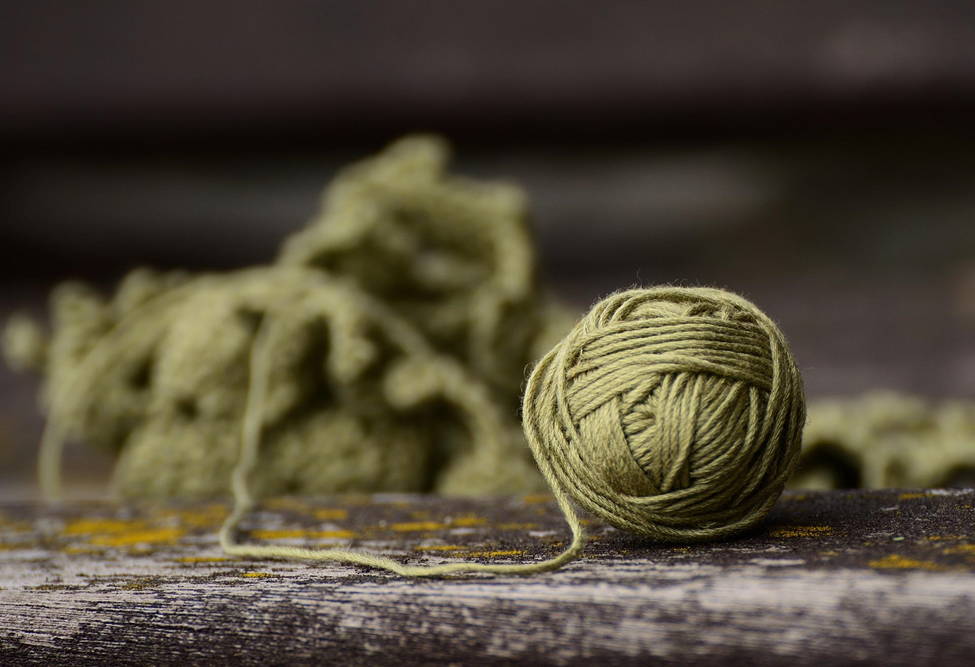How to Choose the Best Yarn for Hats

Source: Miriam Alonso on Pexels
Hats are usually one of the first projects both knitters and crocheters decide to try their hand at once they pick up the craft. However, there’s so much more to making a hat than just picking up any yarn and going for it. Picking the right yarn for the hat, whether you’re knitting or crocheting, will have a huge impact on how the final piece turns out. If you’re not sure how to choose the best yarn for hats, you’ve come to the right place. Read on to find out what your options are and what to consider when picking.
How to Choose the Right Yarn for Your Hat Project
When choosing the best yarn for a hat, there are a number of factors you should take into consideration, such as the type of hat you’re making, the fiber content of the yarn, and so on.
Type of Hat

Source: Sergio de Paula on Unsplash
The type of hat you want to make plays a major role in the choice of yarn you should choose. For instance, if you’re making a summer hat, lighter-weight yarns should be the top choice so that the headpiece isn’t too warm. If the hat is going to have a brim, you should go for a yarn thick enough to maintain the shape. Needless to say, winter hats should be made of thicker yarns such as wool. If you’re knitting or crocheting a baby beanie, it’s important to go for a softer yarn that won’t irritate the baby’s skin.
Yarn Weight
Yarn weight will play a role in the final look, texture, and feel of your hat. As we already mentioned, the thicker the yarn, the warmer the hat. However, the weight of the yarn should also depend on the shape of the hat. If the hat needs to hold a certain shape (such as the brim), thicker types of yarn will be easier to work with.
Yarn Fabric
Perhaps even more important than the weight of the yarn you choose is the fiber content. This will define things such as the warmth of the hat, its softness, durability, and elasticity.
Warmth and Insulation
If you’re looking to make a warm hat for winter, wool and wool blends should be among your top choices, as they usually retain heat quite well. On the other hand, if you’re looking for a more breathable material for a summer hat, cotton would be a good choice, along with cotton blends.
The softness and comfort of the yarn are especially important when it comes to hats since they are in prolonged and direct contact with the face. Wool is generally considered a good option, but some people might find it irritating. Cotton is another good, gentle fiber. In addition, synthetic fibers such as acrylic are great for people who are allergic to animal yarns (such as merino or alpaca wool). Lastly, cashmere and silk are known to be some of the softest materials out there, but they also tend to be on the more expensive side.
Durability and Strength
Since hats are meant to be worn, it is important that they are durable and can sustain exposure to different weather conditions, humidity and moisture, and so on. As they are in close contact with the face, they also need to be washed regularly, and the yarn you choose should be sturdy enough to endure that. Superwash wool is, quite literally, made for that.
Stretch and Elasticity
How stretchy the material should be, again, depends on the type of hat you’re making. For instance, beanies need to be stretchy so that they fit snuggly and remain on the head. For instance, polyester and nylon tend to be quite stretchy (although they irritate the skin on their own, so always use a blend). On the other hand, beach hats and other brimmed hats need to be sturdy, rather than elastic. Cotton, for instance, doesn’t have much of a stretch to it.
Texture & Stitch Pattern
Not all yarn works well with all types of textures. If you’re looking to make a more textured piece, thicker yarn will do the trick. On the other hand, if you want a smoother surface, thinner yarn is the way to go. Naturally, the texture will also depend on the types and sizes of stitches you’re making, as well as on whether you’re crocheting or knitting the hat.
Ease of Care
Are you going to hand-wash your hats, or would you rather simply toss them in the washing machine? The time and effort you’re willing to put into caring for your pieces will also have an impact on which type of yarn you should use. If you’re planning on giving someone else the hat as a gift, make sure they’re also aware of the proper care instructions.
Color Options
Beyond just being practical and keeping us warm, hats are also fashion statements. In other words, the color (or colors) you decide to go with should reflect your preference and style (or the style of the person you’re making the hat for). This is why you will need to choose a yarn that comes in your preferred shades.
Cost of Yarn
Unfortunately, the cost of yarn also plays a role in the final choice. Exactly how much a yarn costs depends on a number of factors, such as the fiber content, the brand, the size of the skein, and so on. Luckily, hats tend to be relatively small and can usually be made out of a single ball of yarn (or several, if you’re planning on using multiple colors).
Best Yarn for Hats (Knit & Crochet)
By now, you should have at least a general idea of the type of yarn you should use for your hat project. Let’s take a look at some of our favorite yarns by fiber content.
Wool Yarns

Source: Congerdesign on Pixabay
As we already mentioned, wool yarn is typically the go-to option for winter hats, as it is both warm and soft. Additionally, wool has a certain level of stretch to it, making it great for beanies. However, there are different types of wool you can choose from:
- Merino wool comes from merino sheep and is known to be very fine and soft. It can be used for anything from socks to hats. If you want to try making a hat with merino wool, we recommend the Premier Spun Colors merino and acrylic blend.
- Cashmere comes from cashmere goats. Much like merino, it is known for being a very soft, buttery material. However, it also tends to be on the more expensive side, and its production raises certain environmental concerns.
- Alpaca yarn is yet another option for wool hats. It looks quite similar to sheep wool and gives off a luxurious feel. It also tends to come in a wide variety of colors.
Acrylic Yarns
While wool is a great option for many, some people find animal fibers too irritating for their skin. This is where acrylic yarns come in. Some benefits of using acrylic yarn are that it is washing machine-friendly, easy to work with (even for beginners), and very elastic. If you decide to go for acrylic fiber, we have a couple of recommendations:
- Caron Simply Soft 4-ply Yarn comes in an incredibly wide variety of shades, including solids, ombres, and stripes. It is a reasonably priced, medium-worsted yarn that requires size-8 knitting needles or a size-H hook. If you want to crochet a fun hat for kids with Caron, we suggest this free Lambchop Hat pattern.
- Red Heart Soft is a great option if you’re looking for affordable, quality acrylic yarn. It comes in fewer shades, all of which are solids, but it makes up for it in its versatility. Red Heart can be used to knit or crochet anything from blankets and throws to hats and mittens. If you want to crochet your hat with this yarn, try this Winter Trellis Hat pattern.
- Lion Brand Heartland comes in solid and tweed shades. Solids are 100% acrylic, while tweeds contain a small percentage of rayon. This is another medium worsted yarn that can be used for a wide variety of projects. If you want to give it a shot, we recommend this Simple Texture Slouch Hat pattern.
Any of our Mary Maxim acrylic yarns are also very good options. Starlette, Mellowspun and Titan are good options and some of our top yarns.
Blended Yarns
Fiber blends are probably the best option when knitting or crocheting wearable items such as hats. In fact, wool fibers often come in blends, rather than 100% wool, for this precise reason. Want to try out some blended yarns? Wool acrylic blends are quite popular, as they maintain the same level of softness and have increased durability for a lower price. If you want to try wool acrylic blends, we recommend Premier Coffee Shop Yarn, an 85% acrylic and 15% wool blend, and Lion Brand Wool Ease Yarn, an 80% acrylic and 20% wool blend.
Another great blend is alpaca and acrylic. Mary Maxim Natural Alpaca Tweed contains 77% acrylic, 20% alpaca wool, and 3% viscose. It is a medium-worsted weight yarn great for both knitting and crocheting. It retains heat but is still quite lightweight, making it a great option for hats and other cool-weather garments, such as cardigans.
Lastly, merino and silk blends are great fibers that offer a luxurious look and feel. They tend to be finer and thinner, making them a great option for fashionable accessories. If you want to try out a merino silk blend, check out Mary Maxim Silk Merino Sock Yarn. Although this yarn was originally designed for socks, as the name suggests, you can definitely use it for other types of projects, too.
Common Hat Yarn Questions
Do you still have some questions regarding the best yarn for hats? Read on — maybe we’ve already answered them for you!
Is Chunky Yarn Good for Hats?
Chunky yarn is good for warm winter hats, as it is thick enough to keep the wearer warm and protected from the wind. Additionally, since chunky yarn is quite thick, the project itself will work up fairly quickly.
What Yarn is Soft and Not Itchy?
Cashmere, merino, and silk are some of the softest, least itchy materials you can crochet and knit with. Additionally, some synthetic fibers, such as acrylic, are good non-irritating options for those who are allergic to animal fibers.
How Much Yarn Do I Need for a Hat?
If you’re making a solid-color hat or using a multi-color yarn, one or two skeins of yarn will usually be more than enough. Depending on the type of yarn, you will need anywhere from 30 to 325 yards for a hat. However, some more intricate patterns might require more than that.
Is Silk Yarn Good for Hats?
Silk is a good option for hats, as it is a good insulator but also lightweight and breathable. This makes it a great yarn for hats for all seasons.
Is Nylon or Cotton Better for Hats?
Both nylon and cotton are good fibers for summertime hats, as they are lightweight and breathable. You can also consider using a nylon and cotton blend. However, if you’re making a winter hat, you should go with some other fibers, such as wool.
Conclusion
In short, the best yarn for your hat project, be it knitted or crocheted, will depend on various factors. Some of the best options on the market include wool and wool blends, as well as cotton and acrylic. We hope this quick guide has been helpful in helping you find the best hat yarn. And if you need some more fun and easy patterns to start with, we recommend this Football Hat knit pattern or this free Pumpkin Patch Hat pattern.

